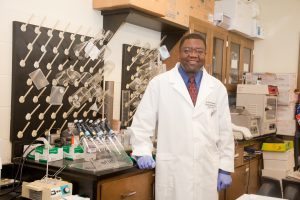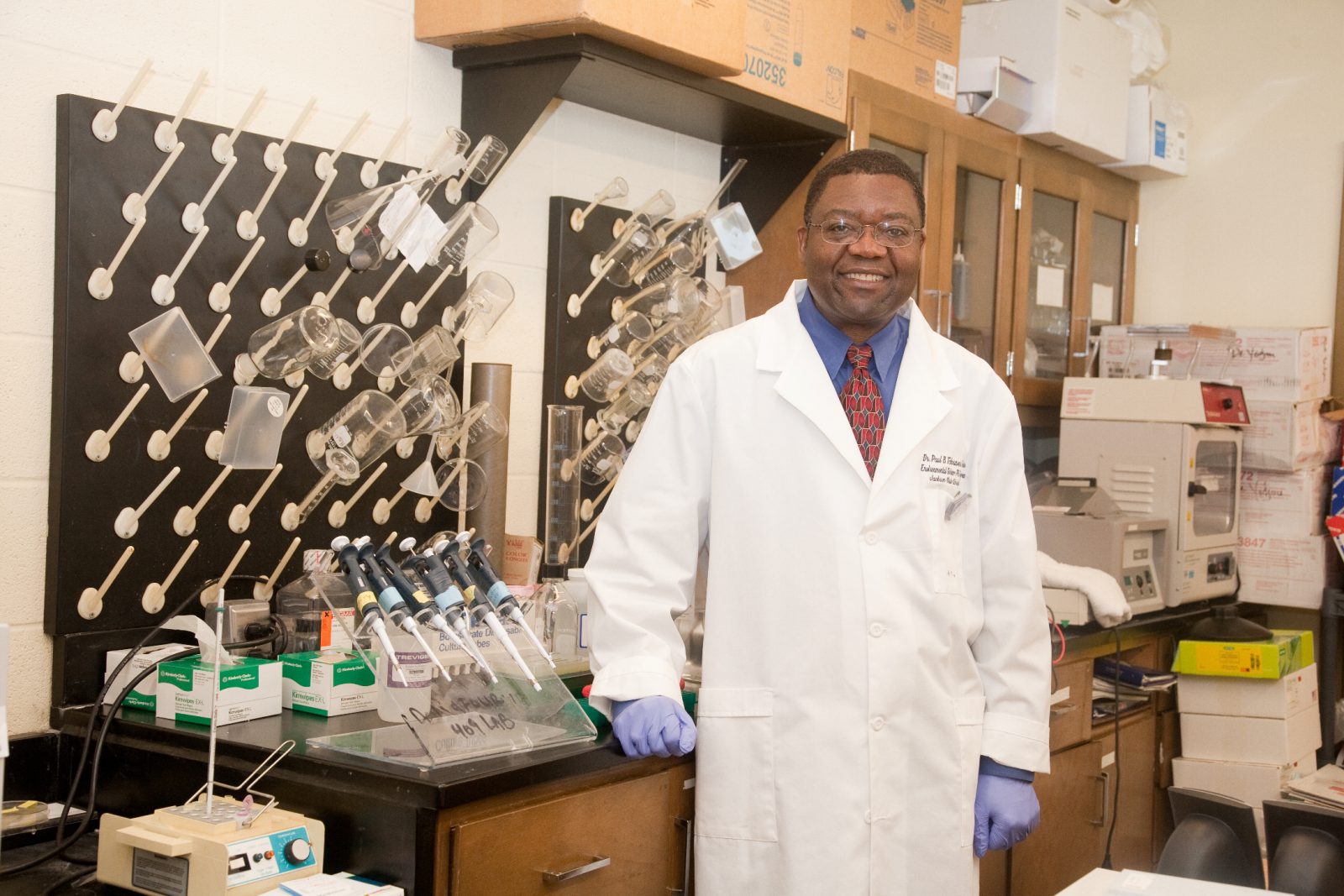(JACKSON, Miss.) – Jackson State University’s Research Centers at Minority Institutions (RCMI) Center for Environmental Health (CEH) has been awarded a $10.7 million grant from the National Institutes of Health-National Institute on Minority Health and Health Disparities.

The five-year grant will be used to enhance the center’s biomedical infrastructure to support research that addresses environmental and public health issues impacting vulnerable and underserved communities.
“The center has a long history of conducting innovative research in environmental health, and this award will allow the institution to continue to develop its biomedical research infrastructure, acquire state-of-the-art instrumentation, recruit talented investigators and research staff, provide professional development, and support our strategic plan in the critical area of research and scholarly engagement,” said JSU President Carolyn W. Meyers.
For the past 15 years, RCMI-CEH has focused its efforts to study the biochemical and physiological effects resulting from exposure to environmental compounds. The center deploys innovative laboratory and sensitive analytical technologies to understand how such exposure to toxins and carcinogens compromises human health and contributes to disease and death that disproportionately affect minority populations in the U.S.
“The new grant will allow RCMI-CEH to move to a higher level of biomedical research excellence by strengthening its current infrastructure, and developing a critical mass of biomedical scientists who have the technical skills to address current and future health challenges in a cost-effective manner,” said Dr. Paul B. Tchounwou, principal investigator and program director.
Since its inception in 1998, RCMI-CEH has had a tremendous impact on JSU’s College of Science, Engineering and Technology, and the university as a whole. This is evidenced by the number of publications in peer-reviewed journals by RCMI investigators, presentations at scientific meetings, invited speakers at the distinguished seminar series, and workshops organized in core laboratories.
“Our vision is to continue to develop and implement new approaches and cost-effective strategies for the prevention, detection, and control of toxic and carcinogenic environmental contaminants and the resultant diseases that they cause,” said Tchounwou, who is associate dean for Graduate and International Programs in the College of Science, Engineering and Technology.
By leveraging the RCMI support, investigators have obtained more than $20 million in external grants. As a result of the center’s mentoring program, one of the pilot project investigators received a prestigious National Science Foundation CAREER grant award in 2011. More than 100 M.S. and Ph.D. students have been able to complete their research and graduate from JSU thanks to the existence of RCMI-supported resources.
New scientific discoveries made at the CEH are making a substantial contribution to advancing the understanding of the role played by the environment in the development of human diseases, and to developing cost-effective strategies to prevent and control these illnesses.
“By developing the biomedical research infrastructure, the center will help Jackson State University build a critical mass and train the new generation of biomedical scientists who will make significant contributions to scientific advances in public health,” said James C. Renick, provost and vice president for Academic Affairs. “It also will accelerate the pace of scientific discoveries on chronic diseases that disproportionately affect minorities and underserved populations.”
The new award will support several key activities including the enhancement of existing core laboratories: Analytical, Animal, Bioinformatics and Biostatistics, Confocal Microscopy, Cellomics and Toxicogenomics, Molecular and Cellular Biology, and Molecular Magnetic Resonance. The award also will support the development of strong biomedical research collaborations and the implementation of a pilot project program that provides financial support for the conduct of scientifically meritorious and innovative pilot projects in environmental health and health disparities research through a competitive process with open solicitation, peer-review. It also will support funding in two grant mechanisms, including career development and creative partnership awards; and the recruitment/hiring of junior investigators to strengthen the critical mass of biomedical research at JSU.
The grant will support research projects on environmentally-induced diseases such as cancer, cardiovascular disease, hypertension, diabetes, asthma, chronic obstructive pulmonary disease, and/or neurobehavioral diseases.
Tchounwou said the mission is to continue to develop an innovative biomedical research program in which faculty become highly competitive and successful in winning mainstream NIH, NSF, and other federal grants.








Congratulation Dr. Tchounwou.
Congratulations, Dr. Tchounwou.
This is absolutely Fantastic, Dr. Tchounwou! A true credit to your grantsmanship and scholarship as a scientist!
Dr. Tchounwou congratulations! Thank you for all your hard work and dedication in moving CSET and JSU forward.
Congratualations, Dr. Tchounwou!
Congratulations Dr. Tchounwou.